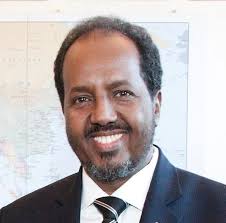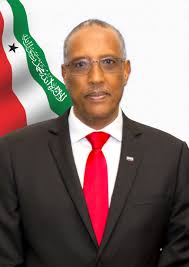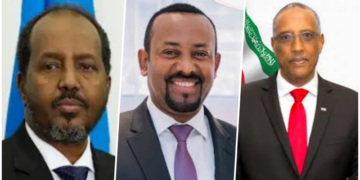- Ethiopia, Somaliland reached MoU on use of Ports in Berbera, others
- Somalia condemns the agreement, says it is an act of “aggression”
- Tension brews in the region as Somaliland seeks recognition of statehood
On January 1, 2024 Ethiopia and Somaliland signed an agreement granting the later a naval and commercial access to ports along Somaliland’s coast, which include but not limited to Port of Berbera in exchange for recognition for the breakaway republic’s independence.
However, speaking at the press conference in the Ethiopian capital, Addis Ababa, after his meeting with the country’s prime minister, Abiy Ahmed, Somaliland’s president, Muse Bihi, stated that “we are pleased to announce, and want to express gratitude to the prime minister, and Ethiopia, according to our agreement written here, that we will give 20km of sea and they will recognize us.”
On X, formerly Twitter, Somaliland’s ministry of foreign affairs also said that the agreement was for a 50-year access lease.
Ali Hassan Mohamed, Somaliland’s information minister, described the deal as a “gamechanger”, reiterating his government’s view that the deal involved 20km (12 miles) of sea access in exchange for diplomatic recognition.

In a statement published on X Abiy’s office welcomed the agreement but made no mention of recognition of Somaliland, only committing to “advance mutual interests through cooperation on the basis of reciprocity”.
The statement further added that “the memorandum of understanding shall pave the way to realize the aspiration to secure access to the sea and diversify its access to sea ports,” ushering in a “new chapter of cooperation” and “regional integration in the Horn”.
Again, Redwan Hussein, an adviser to Abiy Ahmed, said the deal was a “step ahead in the right direction for this and generations to come”, while adding that details of the memorandum would be formalised in a follow-up meeting in a month.
WITHIN NIGERIA gathered that the meeting between Ethiopia and Somaliland came days after Somalia and Somaliland announced a breakthrough in talks in Djibouti, which further committed dialogue between their respective capitals.
However, since the signing of the signing of the Port deal between Ethiopia and Somaliland, a fresh political crisis has erupted between long time enemies, Somaliland and Somalia.
Since 1991, the territory has been governed by democratically elected governments that seek international recognition as the government of the Republic of Somaliland. The central government maintains informal ties with some foreign governments, who have sent delegations to Hargeisa. Somaliland is currently recognised by the Republic of China (Taiwan) and hosts representative offices from several other countries, most notably Ethiopia. However, Somaliland’s self-proclaimed independence has not been officially recognised by any UN member state or international organisation. It is the largest unrecognised state in the world by de facto controlled land area. It is a member of the Unrepresented Nations and Peoples Organization, an advocacy group whose members consist of indigenous peoples, minorities and unrecognised or occupied territories.
Ethiopia lost access to its Red Sea ports in the early 1990s when Eritrean insurgents in the country’s north gained control of Ethiopia’s northern coastal region – which was a former Italian colony – and then declared independence.
Following the declaration of the Sovereign state of Eritrea in 1991, Ethiopia lost majority of her coastal area to the independent Eritra.
Ethiopia is heavily reliant on Djibouti for international trade, with more than 95% passing through the Addis-Djibouti corridor, a vulnerability it has sought to mitigate by diversifying its options. Ethiopia has been signalling its interest in acquiring access to ports along east Africa’s seaboard since October, and said it would assert its rights, raising concern among its neighbours.
Mr Abiy had previously described sea access as an “existential issue” for his country.
His national security adviser, Redwan Hussein, also said on X that the arrangement could enable Ethiopia to access a “leased military base” on the sea, but gave no further details.
An MoU is regarded as a statement of intent and can lead to a legally binding treaty. The development is being portrayed by both sides as a major diplomatic step.
It said that Ethiopia agreed to recognise its independence at some point in the future in exchange for military access to the coast. Ethiopia has not confirmed this aspect of Monday’s contentious deal.

Instead, the office of Ethiopia’s Prime Minister Abiy Ahmed said it signed what is known as a memorandum of understanding (MoU) “to secure access to the sea and diversify its access to seaports”.
Mr Abdi said the agreement included a section stating that Ethiopia would at some point in the future recognise Somaliland as an independent country.
Somaliland’s foreign ministry said in a statement that the “agreement ensures Ethiopia’s access to the sea for their naval forces, reciprocated by formal recognition of the Republic of Somaliland, marking this as a significant diplomatic milestone for our country”.
It quoted the president as saying that recognition would be in “exchange for 20km (12 miles) sea access for the Ethiopian naval forces, leased for a period of 50 years”.
Reactions of Somalia to the agreement
Few hours after the signing of the deal, Somalia described the agreement that landlocked Ethiopia made with the self-declared republic of Somaliland over sea access as an act of “aggression”.
In the same vein, Somalia reacted angrily to the MoU as it sees Somaliland as part of its territory.
It said it was recalling its ambassador to Ethiopia. The government said the agreement was “null and void” and a violation of its sovereignty.
In a statement it added that it “considers this action as an aggression and… is an impediment to the good neighbourliness, peace and stability of the region which [is] already struggling with many challenges”.
Somalia’s Prime Minister Hamza Abdi Bare urged people to remain calm.
“I want to assure them that we are committed to the defence of the country. A part of our land, our sea and our air cannot be violated and I will defend it in every legal way,” he said at a hastily arranged press conference.
According to President Hassan Sheikh Mohamud “no-one has the power give away a piece of Somalia”.
“Somaliland, you are the northern regions of Somalia. Ethiopia has no recognition for you,” he added.
Somalia also said it wanted the UN Security Council and the African Union to discuss the issue.
The exact details of Monday’s agreement that was signed by Prime Minister Abiy and Somaliland’s President Muse Bihi Abdi in the Ethiopian capital, Addis Ababa, are not known.
Not done with that, on Wednesday, January 3, people of Somalia came out in their thousands to protest the deal.
“People gathered here today… to protest the aggression against their country and protect it from the enemy,” Mogadishu mayor Yusuf Hussein Jimale told a rally at a stadium in the Somali capital.
“These people feel that their unity has been violated,” he added. “They feel that part of their land is to be looted and they have gathered here to reject that aggressive ambition.”
The demonstrators, most of them students, chanted slogans against Somaliland president Muse Bihi Abdi and Ethiopian Prime Minister Abiy Ahmed who signed the controversial memorandum of understanding in Addis Ababa on Monday.
“Somalia will fight with whatever means and win against the aggression of the Ethiopian government,” said one protester, Mohamed Nur Adan.
IGAD reactions to the deal
Also reacting to the development, the Intergovernmental Authority on Development (IGAD) has expressed “deep concern” about a Memorandum of Understanding (MoU) signed earlier this week between the Ethiopian and Somaliland governments.
A statement from IGAD Executive Secretary Workneh Gebeyehu (PhD) released today says the organization is “monitoring the situation and recognizes the potential implications for regional stability.”
Stakes in state-owned enterprises Ethiopian Airlines and Ethio telecom are also on the table in the Somaliland port deal, according to a social media post from Redwan Hussein (Amb.), security advisor to the Prime Minister.
Implications of the deal
The Al-Qaeda-linked group blasted Somali and Djiboutian leaders over the deal, accusing them of complicity with Ethiopia and the West.
Al-Shabaab’s opposition underscores security risks associated with the agreement. The group could potentially exploit the ensuing tensions to strengthen its position in Somalia. Some experts warn Al-Shabaab may even extend its influence into Somaliland, arguing that Ethiopia’s naval presence could fuel rather than prevent the group’s radicalization agenda. With Al-Shabaab still carrying out frequent attacks in Somalia and retaining control over some rural areas, its stance on the port deal further complicates regional stability.
As it stands, the agreement presents a major diplomatic challenge as regional powers seek to safeguard their interests. Historical rivalries between Ethiopia and Egypt and the Gulf states’ involvement across the Horn of Africa add layers of complexity. Emerging powers like Turkey and China also hold significant sway as key investors in ports and infrastructure. Against this backdrop, the deal’s timely and effective implementation will hinge on careful negotiation of Somaliland’s status with respect to these competing international stakeholders.
Ultimately, for all its potential benefits, the Ethiopia-Somaliland deal represents a risky gambit. While the economic incentives and access to ports address urgent needs for both countries, the attendant tensions with Somalia and instability posed by Al-Shabaab reaction could negate these gains.
Much depends on how skillfully Ethiopia and Somaliland navigate regional dynamics as they pursue this controversial alignment. In the end, enhancing long-term prosperity in the Horn of Africa will require not just economic integration but also political reconciliation and strengthened regional security. The complexities around this deal demand patience and diplomacy if greater harmony is to prevail.
The government of Somalia also rejected IGAD’s statement. “The [IGAD] statement unfortunately falls short of condemning the Ethiopian government of violating the sovereignty and territorial integrity of Somalia contrary to the fundamental principles of UN, AU, IGAD and other international laws,” reads the statement issued by the Somalia government hours after IGAD’s statement.
In the statement, the Somalia government called upon the executive secretary of IGAD, to “immediately apologize, withdraw the statement and take the appropriate action.”
Security implications of the Somalia/Somaliland crisis
According to some school of thought, this new deal between Ethiopia and Somaliland will further aggravate security situation in the region.
“This signing of a memorandum of understanding will upside down the relationship of the two countries back to the era of Siad Barre administration,” Surafal Getahun, who teaches political and international relations at Dire Dawa University in Eastern Ethiopia, told DW.
“This leads the entire region to a great crisis. And it will endanger the relationship between the countries in the region.”
WITHIN NIGERIA gathered that though, it is not yet clear if the Somali government will use armed option to resolve the issue, it could be recalled that at some time, Somalia has unsuccessfully attempted to reconquer the Ogaden border region from Ethiopia during the 22-year reign of Siad Barre, who was Somalia’s dictator until 1991.
In addition to the full-scale war in 1977-78, Somalia has deployed rebel militias in what is now Ethiopia’s Somali region.
At the same time, there’s reason to doubt that Mogadishu would engage in an armed confrontation with Ethiopia, a country whose military spending is three times higher and is part of the coalition fighting the Al-Shabab militant organization within Somalia.
“What can they do with their big neighbor?” asked Medhane Tadesse, who lectures at King’s College in London and Institut des Mondes Africains in Paris.

“They might be involved in destabilization strategies by working with other countries like Gulf powers, probably supporting being a gateway for Ethiopian insurgent groups. But mainly, I think their main agency would be international diplomacy,” Tadesse explained.
Somalia has received backing from the European Union, the United States and the African Union, which have supported its territorial integrity.
Ethiopia’s new partnership with the UAE
According to Tadesse, the issue is directly connected with regional geopolitics, namely with a Saudi-led security initiative founded in 2020 with other Red Sea countries.
“Both the United Arab Emirates and Ethiopia are not part of it,” Tadesse pointed out. “There has been some kind of evolution of two broad camps. And Ethiopia and Somalia are not in the same camp.”
It is an open secret that the UAE has been playing an active role in the Saudi-led intervention in the Yemeni civil war. The UAE holds influence in the south of the war-struck country, mainly through local groups.
Just 250 kilometers (155 miles) further south lies the port of Berbera, the bone of contention and epicenter of the crisis.
With another ally, the UAE would increase its influence on both sides of the Gulf of Aden, the gateway to the global trade shipping route through the Red Sea and Suez Canal.
As Tadesse explained, teaming up with Ethiopia makes sense for the UAE for various reasons.
“They wanted the hinterland. They wanted that access. But more than that, it’s the security component as well. It’s an alliance making. It’s easy for the Emirates to work with Ethiopia for their own interest,” said Tadesse.
“And the Ethiopian prime minister is also interested in keeping power at any cost. So he’s looking for any financial support, and he can get it from the UAE.”
Creating more crisis in the region will certainly lead to rejuvenation of terrorists group like Al-shabab, Al-Qaeda in Magreb, ISIL and other armed non state actors in the region which have become a thorn in the flesh as far as security of the sub-region is concerned.





Discussion about this post